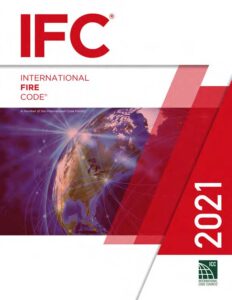International Fire Code 2021
International Fire Code 2021
International Fire Code 2021 (IFC) is in use or adopted in 41 states, the District of Columbia, NYC, Guam and Puerto Rico. It contains regulations to safeguard life and property from fires and explosion hazards.
Topics include general precautions, emergency planning and preparedness, fire department access and water supplies, automatic sprinkler systems, fire alarm systems, special hazards, and the storage and use of hazardous materials.
You can also Read International Fuel Gas Code 2021
Key changes to the 2021 IFC include:
- New requirements for Additive Manufacturing (3-D Printing) equipment and operations for both non-industrial and industrial applications.
- verification requirements for flame propagation performance of permanently installed artificial combustible vegetation when exceeding certain heights located on roofs or in close proximity to buildings.
- New provisions for emergency responder communication systems.
- New sprinkler requirements for the storage, manufacture and sale of upholstered furniture and mattresses. Also, an automatic sprinkler system is now required for open parking garages exceeding a certain fire area threshold.
Fire Code 2021
Newly refined requirements for energy storage system (ESS) reflecting the variety of new technologies and applications (in building and standalone) and the need for both commissioning and decommissioning of such systems.
A new chapter providing much-needed clarification and specific requirements for the storage of distilled spirits and wines in barrels and casks.
Reorganized and expanded provisions for construction fire safety with an emphasis on the owner’s responsibilities. The new language requires a site safety plan and designation of a site safety director.
If you live in one of the 41 states that will soon adopt this code, order your copy today to be sure you’re on top of all the most current regulations.
The IFC kept up to date through the review of proposed changes submitted by code enforcement
officials, industry representatives, design professionals and other interested parties. Also, Proposed
changes carefully considered through an open code development process in which all interested
and affected parties may participate also.

Comments are closed.